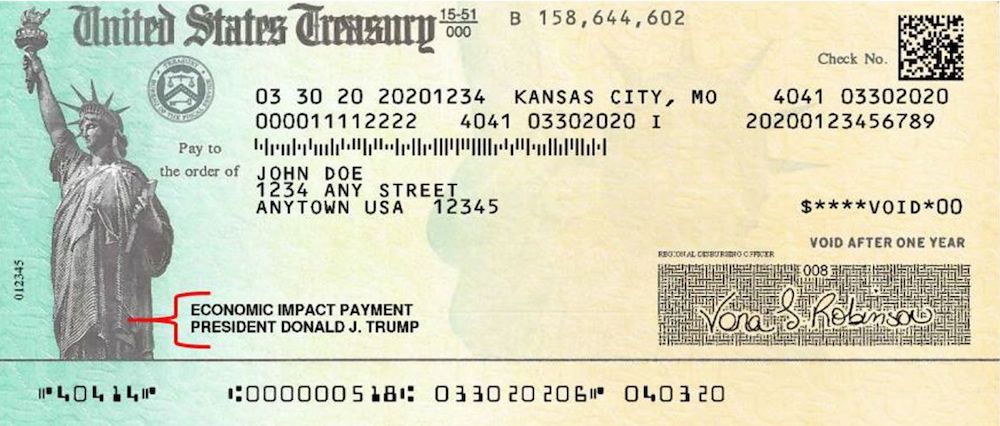(Editor’s note: Dispatches executives got incorrect information regarding expat stimulus payments directly from IRS personnel. So, our personal recommendation is to consult with tax experts such as Doug when dealing with complex or unclear tax issues.)
The governmental restrictions intended to mitigate the spread of the COVID-19 virus resulted in recession conditions in much of the world. The United States responded with the Coronavirus Aid, Relief, and Economic Security (CARES) Act in March and the Consolidated Appropriations Act, often called CARES 2, in December 2020. Both provided for Economic Impact Payments to individual taxpayers, often referred to as “Stimulus Payments.”
Expats ARE eligible for stimulus payments
Americans living outside of the United States were eligible for both payments. If you did not receive one or both of the payments, you may be eligible to claim them as a refundable credit on your 2020 Federal Income Tax return.
The Economic Impact Payments were really an advance payment on the Recovery Rebate Credit, which will be claimed in your 2020 return. The payment in March was $1,200 (individual), $2.400 (Married filing Joint), and the payment in December was $600 single, $1,200 MFJ.
An additional $500 (March) and $600 (December) was included for eligible dependent children. The payments can’t be included in gross income, but are phased out above Adjusted Gross Income (AGI) of $75,000 single, $150,000 MFJ, and $112,500 Head of Household. Each payment/credit will be reduced by 5 percent of the amount of AGI above the threshold.
Many Americans living abroad did not receive their payments because of international mail issues, unfiled prior year returns or income limitations.
I have an American citizen expat client who called the IRS about her non-payment and was told that she was a Non-Resident Alien, and therefore not eligible. Sounds like a teaching moment for the IRS.
Many American expats are married to non-U.S. citizens and still file a joint return using an Individual Taxpayer Identification Number (ITIN) to include the non-citizen spouse in the return.
The details
The Recovery Rebate Credit requires a Social Security Number valid for employment in the United States to qualify for the credit. However, a partial credit will apply to the joint return based on the Social Security Number of
only one of the spouses. A full joint return credit will be available if one of the spouses is a member of the United States Armed Forces and only one spouse has a valid Social Security Number.
The income limitation in both Economic Impact Payments was calculated on AGI reported either the 2018 or 2019 filed income tax returns. If you, like so many Americans, saw your income fall in 2020, you might be eligible for an additional amount in the calculation of the Recovery Rebate Credit in your 2020 Federal income tax return.
The Rebate Credit will be calculated on your 2020 AGI, so if that year was
lower than the previous years, you may be eligible to recover some or all of any limitation applied. However, if your 2020 AGI is higher than 2019, and it would result in a reduced or limited Recovery Rebate Credit, you will not be expected to repay any amount of the Economic Impact Payments you received in either the first or second round of payments.
That principle also applies to payments received for dependent children eligible on your 2018 or 2019 return, but who are no longer eligible in
your 2020 return.
More relief on the way
Another round of Economic Impact Payments is in the works. On February 27 the House of Representatives passed its version of the American Rescue Plan Act which includes a provision for payments in 2021. The Act provides for $1,400 single, $2,800 MFJ plus $1,400 for each dependent.
AGI limitation thresholds will remain the same, and will be applied from either 2019 return or 2020 if already filed. If your 2020 income exceeds the limitation threshold more than 2019 did, you would be better served to wait, even extending your return if necessary, until your Economic Impact Payment is received, to file your return.
That extension may also be in the works. On 18 February, the Chairman of the House Ways and Means Committee sent a letter signed by all the majority party committee members to the IRS Commissioner requesting an extension of the filing and payment deadline to 15 July, 2021.

About the author:
Doug Ralph is a certified public accountant and an expert in U.S. expat taxation. You can read his blog here.
Doug is based in New Mexico. You can reach him for tax advice at: [email protected].
Read more here on Dispatches about taxes and official requirements for expats.














